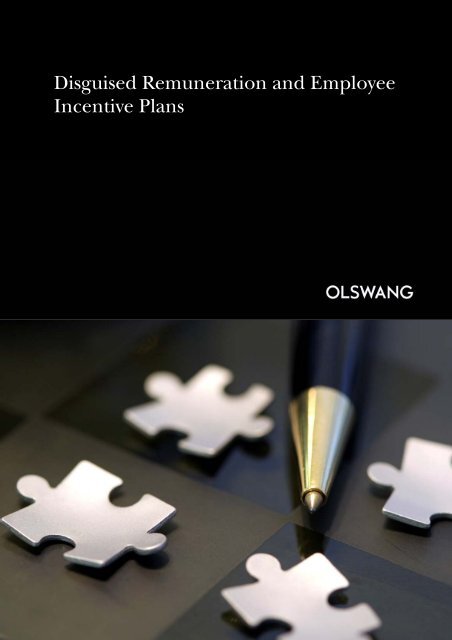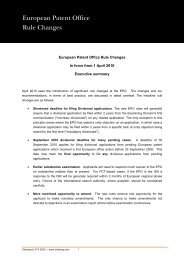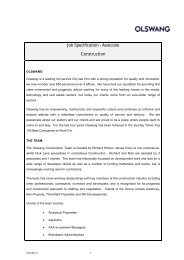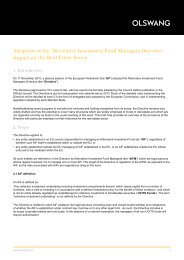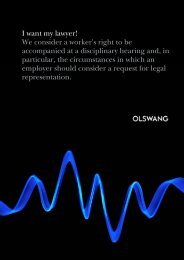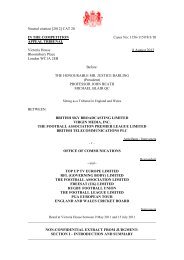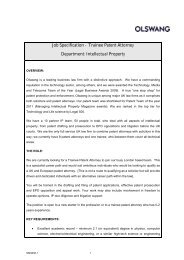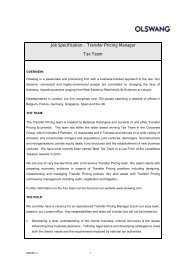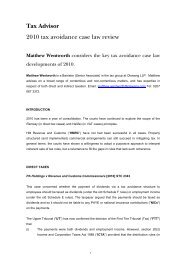Disguised Remuneration and Employee Incentive Plans - Olswang
Disguised Remuneration and Employee Incentive Plans - Olswang
Disguised Remuneration and Employee Incentive Plans - Olswang
Create successful ePaper yourself
Turn your PDF publications into a flip-book with our unique Google optimized e-Paper software.
<strong>Disguised</strong> <strong>Remuneration</strong> <strong>and</strong> <strong>Employee</strong><br />
<strong>Incentive</strong> <strong>Plans</strong>
<strong>Disguised</strong> <strong>Remuneration</strong><br />
<strong>and</strong> <strong>Employee</strong> <strong>Incentive</strong>s<br />
<strong>Plans</strong>: how to protect<br />
against a tax charge<br />
Under the "disguised remuneration" legislation, which came into full effect from 6 April 2011, income tax<br />
<strong>and</strong> NICs charges can arise where a third party either pays, transfers or makes available an asset for an<br />
employee's benefit or "earmarks" an asset for an employee (each described as a "relevant step" under the<br />
legislation) or makes any form of loan to an employee. It is therefore particularly relevant for a company<br />
that operates its employee incentive plans via an employee benefit trust ("EBT") or another third party.<br />
The impact of the legislation can be severe: if a tax charge arises, the employer must account for income<br />
tax on the value of the relevant step via PAYE, <strong>and</strong> pay class 1 NICs, regardless of whether the<br />
employer is aware that a relevant step has been taken, <strong>and</strong> must recover the income tax from the<br />
employee within 90 days of the relevant step or the PAYE amount will itself be treated as a further taxable<br />
benefit.<br />
The charge where a third party earmarks an asset for an employee raises particular concerns, as it can<br />
trigger tax for the employee <strong>and</strong> employer long before the employee receives any benefit <strong>and</strong> regardless of<br />
whether an actual benefit is ultimately delivered.<br />
What can companies do to protect against a charge?<br />
The legislation now includes a number of complex exclusions in relation to incentive arrangements, <strong>and</strong> a<br />
company which operates a st<strong>and</strong>ard form employee share plan may well be able to rely on one of these,<br />
rather than it <strong>and</strong> its employees facing a tax charge. Nevertheless, care must be taken when relying on<br />
any exclusion, as its availability will depend upon the specific terms of the company's incentive plan, <strong>and</strong><br />
the exclusion may also cease to apply if the plan is administered in a certain way. Therefore, there are still<br />
a number of ways in which a company can unwittingly trigger a charge under the legislation. In order to<br />
protect as far as possible against this occurring in relation to their incentive plans, companies should aim to<br />
do the following:<br />
Be careful with the wording of any communications with its EBT trustee: An inadvertent earmarking<br />
can occur in a wide range of circumstances, including where the EBT trustee agrees to apply a specified<br />
amount of money or other asset in order to satisfy a particular employee's future entitlement.<br />
Avoid the grant of awards by a third party unless an exclusion applies: If the EBT trustee (or any<br />
other third party) grants an option or award over shares or other assets, this is likely to involve an<br />
earmarking <strong>and</strong> tax will therefore arise unless an exclusion is available.<br />
Take additional steps when an unapproved award lapses: An earmarking charge can apply if<br />
earmarked cash or assets which previously qualified for an exclusion cease to be held under the terms of<br />
the relevant plan but continue to be "earmarked" for an employee. Therefore, when an award lapses (for<br />
example, when employment ends), appropriate communications with the EBT trustee may be needed in<br />
order to prevent this.
Check leaver provisions under unapproved share plan rules: Unless the plan normally only permits<br />
vesting of awards on an exit event of the company, an exclusion from the earmarking charge will only be<br />
available if there is a reasonable chance that the award will not vest. Companies may need to amend the<br />
leaver provisions in their share plan rules in order to be able to meet this requirement <strong>and</strong> benefit from an<br />
exclusion.<br />
Monitor the numbers of shares / other assets held for the purposes of satisfying awards: If an<br />
exclusion from the earmarking charge is being relied upon, in certain cases the number of shares or other<br />
assets held must not exceed the maximum number "which might reasonably be expected to be needed"<br />
for that plan, otherwise the exclusion will not apply.<br />
The above is a high level summary of key issues relevant to st<strong>and</strong>ard form share incentive plans <strong>and</strong><br />
bonus arrangements. However, the legislation is complex <strong>and</strong> imposes tax charges in a wide range of<br />
circumstances, including in relation to employee loans. The information above is intended as a general<br />
review of the subjects featured <strong>and</strong> detailed, specialist advice should always be taken before taking, or<br />
refraining from taking, any action.<br />
How can we help?<br />
If you would like detailed advice on how the legislation is relevant to your company's arrangements then<br />
please contact either your usual <strong>Olswang</strong> contact or Andrew Quayle on +44 (0) 20 7067 3739<br />
(<strong>and</strong>rew.quayle@olswang.com).<br />
OLSWANG LLP<br />
www.olswang.com
Berlin<br />
Brussels<br />
London<br />
Madrid<br />
Munich<br />
Paris<br />
Singapore<br />
Thames Valley<br />
+49 (0) 30 700 171 100<br />
+32 2 647 4772<br />
+44 (0) 20 7067 3000<br />
+34 91 187 1920<br />
+49 89 203 031 300<br />
+33 17 091 8720<br />
+65 67 20 82 78<br />
+44 (0) 20 7067 3000<br />
15544428


